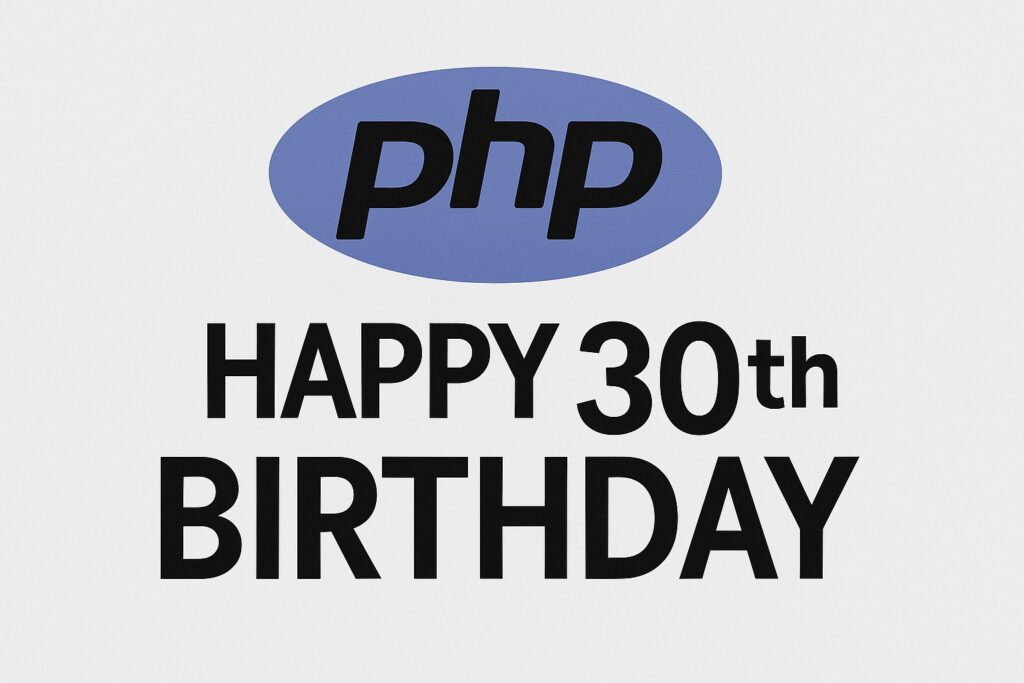Three Decades Transforming the Internet
This month marks 30 years since the birth of PHP, the language that—almost by accident—revolutionized web development. On June 8, 1995, Rasmus Lerdorf released the first version of Personal Home Page Tools (PHP Tools), a set of C scripts designed to help manage personal pages on the nascent web. What began as a simple code library for reusing common routines quickly became the engine that inspired millions of developers to create dynamic sites, giving rise to one of the largest and most enduring communities in technology.
From a Personal Experiment to a Global Standard
PHP’s origins are a story of accidental innovation. Lerdorf wanted to make it easier to generate dynamic HTML pages without endlessly rewriting C code for each project. His idea was to create a kind of “C API for the web” that would allow developers to embed functions directly in HTML documents, cleanly separating business logic from presentation. The result was as simple as it was powerful: anyone could add snippets of logic to their web pages without being an expert in C or compilers.
The community response was immediate. Instead of using PHP solely as a templating system, early adopters began writing more and more logic directly in PHP, transforming it into the scripting language we know today: lightweight, efficient, and free, designed specifically for the web.
Democratizing Web Programming
Ease of learning and the open-source model made PHP the gateway for an entire generation of programmers. For many, it was their first experience with computer programming, allowing them to experiment with creating interactive websites—from simple visitor counters to complex content management systems.
PHP’s integration with the Apache server (through the famous mod_php module) and its ability to rapidly handle HTTP requests enabled the proliferation of dynamic websites long before technologies like Node.js or modern JavaScript frameworks existed.
The Rise of WordPress and the PHP Ecosystem
In 2003, WordPress arrived, built on PHP and MySQL, quickly becoming the world’s most popular content management system. This partnership further democratized web development, letting millions of people create, customize, and manage their own websites without needing to code—while also attracting developers to extend WordPress through plugins, themes, and bespoke solutions.
Today, it’s estimated that over 70% of websites use PHP in some form. Modern tools like Laravel, Symfony, and Drupal have helped update PHP’s image, incorporating best practices and making it easier to build robust, secure, and scalable applications.
The Future: Efficiency, Sustainability, and Integration
Far from stagnating, PHP has continued to evolve. The arrival of PHP 8 and subsequent versions has brought improvements in performance, security, and features, putting it on par with other modern languages. The latest milestone is the official adoption of FrankenPHP into the PHP ecosystem—a Caddy-based application server that promises to simplify deployments, boost performance, and ease integration with languages like Go, C, and C++. FrankenPHP stands out for reducing energy consumption and hosting costs, key factors in the era of cloud and digital sustainability.
FrankenPHP also offers native support for the Mercure protocol, enabling real-time apps, and facilitates using PHP within Go projects—whether servers, proxies, or custom developments. Its integration into the official PHP organization, backed by the PHP Foundation and Les-Tilleuls.coop, marks a new phase of collaboration and synergy for the language.
A Language That Remains Essential
Despite criticism over the years—often due to its permissive syntax or simply because of its massive popularity—PHP has proven its ability to adapt and modernize. If it was once the fastest route to a personal website, today it underpins businesses, startups, institutions, and global platforms.
Celebrating 30 years is not just a tribute to its history but confirmation of PHP’s irreplaceable role in web development and its enduring ability to reinvent itself.
Happy birthday, PHP. Here’s to many more years of innovation and support for millions of developers worldwide.
Sources:
- kieranpotts.com, “PHP is 30”
- Official FrankenPHP integration announcement
- Usage and community statistics (W3Techs, PHP Foundation)

